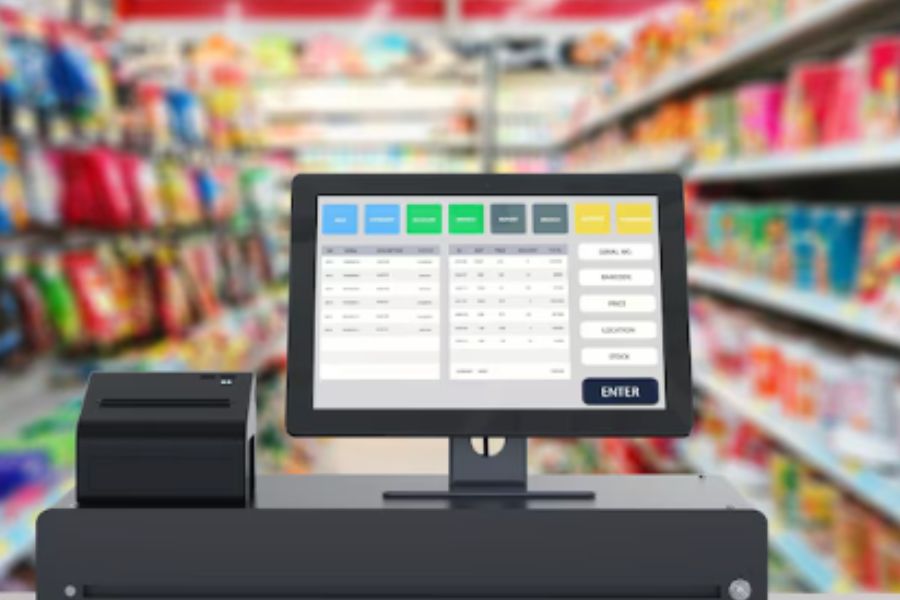Managing inventory efficiently while scaling your e-commerce business can be a daunting task. Challenges such as overselling, stock discrepancies, and delayed deliveries can quickly erode customer satisfaction and damage your reputation. POS ecommerce integration offers a transformative solution, uniting online and offline operations to provide real-time inventory updates, streamlined workflows, and optimized order fulfillment.
This guide highlights the essential features of POS ecommerce integration and how they help streamline warehouse management to keep your business competitive.
Highlight:
- POS e-commerce integration connects online and offline operations, improving warehouse management through synchronized inventory, smoother order processing, and better overall control.
- Real-time inventory updates, centralized data management, automated workflows, barcode scanning, streamlined returns handling, and demand forecasting help businesses manage their warehouses effectively and keep operations running smoothly.
The Role of POS E-commerce Integration in Warehouse Management
Research from Harvard Business Review indicates that customers who engage across multiple channels are willing to spend 13% more in physical stores after conducting online research. This underscores the importance of creating a cohesive shopping journey between online and offline channels to meet growing customer expectations.
There are several ways POS ecommerce integration can support warehouse management.
- Real-Time Inventory Synchronization: One of the most critical benefits of POS ecommerce integration is real-time inventory synchronization. Inventory updates are automatic and instantaneous when online and offline sales channels are integrated.
- Streamlined Order Fulfillment: Integrating ecommerce and POS systems enables businesses to streamline their order fulfillment processes. Orders placed online can be routed directly to the warehouse, where they are processed and shipped efficiently.
- Enhanced Warehouse Efficiency: With POS ecommerce integration, businesses can improve overall warehouse efficiency. The system can categorize products, manage stock levels, and track incoming and outgoing shipments.
- Comprehensive Data Insights: Integrated systems provide businesses with comprehensive data insights that are invaluable for warehouse management. Business owners can analyze sales trends, inventory turnover rates, and seasonal demand fluctuations. T
- Improved Customer Experience: Warehouse management directly impacts the customer experience. When POS and e-commerce systems are integrated, businesses can fulfill orders more quickly and accurately.
- Cost Savings Through Automation: Automation is a game-changer in warehouse management, and POS ecommerce integration is a critical enabler. Automating processes like stock updates, order tracking, and shipment notifications reduces labor costs and minimizes errors
- Flexibility for Multi-Location Warehouses: For businesses operating multiple warehouses or stores, POS ecommerce integration ensures centralized control over stock and orders. Inventory can be redistributed across locations based on demand, and orders can be routed to the nearest warehouse, reducing shipping times and costs.
6 Features of An Integrated eCommerce POS System to Support Warehouse Management
The key to choosing the right POS system lies in thoroughly understanding your business requirements. You can integrate your POS system effectively and avoid unnecessary complications by focusing on 6 essential factors.
Real-Time Inventory Updates
This feature keeps inventory across eCommerce stores and physical outlets synchronized instantly.
Imagine a customer buys the last of a product in-store, but the online system still shows it as available. Without immediate updates, overselling becomes a problem, frustrating customers. Integrated systems update stock levels right away, avoiding such scenarios and providing accurate inventory status.
Centralized Data Management
An integrated ecommerce POS system consolidates all inventory, sales, and customer data into a single platform, simplifying warehouse operations and decision-making.
A business selling both online and in-store often faces the challenge of maintaining separate records for each channel. This fragmentation can result in data duplication or mismatches. With centralized data management, businesses can track orders, monitor stock levels, and access customer purchase histories from one unified dashboard.
Automated Order Fulfillment
Automating order fulfillment is a transformative feature for warehouse management. An integrated system can seamlessly route online orders to the appropriate warehouse for picking, packing, and shipping, eliminating the need for manual intervention.
ConnectPOS automatically sends a customer’s online order to the designated regional warehouse. The system generates a detailed picking list and organizes the shipment information, ensuring that the order is processed efficiently and accurately.
ConnectPOS stands out by supporting businesses with features like multi-warehouse management and real-time order tracking, making it an ideal solution for companies handling large order volumes or operating across multiple locations.
This automation reduces delays, minimizes human errors, and significantly speeds up the fulfillment process, improving both operational efficiency and customer satisfaction.
Barcode and Scanning Integration
Barcode scanning is a must-have feature for any efficient warehouse operation. An ecommerce POS system with barcode integration speeds up inventory tracking, order processing, and shipping.
When new inventory arrives at the warehouse, staff can quickly scan the barcode to update stock levels in the system. Similarly, during order fulfillment, scanning items ensures that the correct products are picked and shipped.
Handling of Returns and Exchanges
Managing returns and exchanges can be complex, especially when dealing with multiple sales channels. An integrated ecommerce POS system simplifies this process by tracking returns and updating inventory automatically.
A customer purchases a product online but decides to return it at a physical store. With an integrated system, the return is processed in-store, and the inventory is immediately updated both online and offline.
Demand Forecasting and Stock Replenishment
An integrated ecommerce POS system can leverage sales data to forecast demand and automate stock replenishment, ensuring the warehouse always has optimal inventory levels.
If the system identifies that a specific product has been selling rapidly over the past month, it can trigger a reorder before the stock runs out. Alternatively, it can predict seasonal demand spikes, such as increased sales of winter apparel in colder months, and recommend stock adjustments accordingly.
Selecting the Right POS Ecommerce System for Warehouse Management
Picking the right system requires careful attention to features that match your operational requirements.
Scalability
Your POS system should accommodate growth as your business expands. Modular options, like those provided by ConnectPOS, let you add features for increased inventory or new locations without disrupting operations.
Ease of Integration
An effective POS eCommerce system must integrate seamlessly with your existing tools, such as inventory management software, CRM systems, and shipping platforms. This connectivity ensures smooth data flow across your operations, reducing manual effort and the risk of errors. Vendors specializing in omnichannel solutions, like ConnectPOS, excel in providing such integrations.
Support for Regional and Global Shipping
If your business operates across multiple regions or serves international customers, choose a system that supports both regional and global shipping requirements. Features like automated tax calculations, currency conversions, and compliance with local regulations are essential for efficient warehouse operations and customer satisfaction.
Automation Capabilities
Automation is a game-changer for warehouse management. From order fulfillment and inventory updates to shipping notifications, automation reduces manual workloads, minimizes errors, and accelerates processes. A POS eCommerce system with robust automation tools allows your warehouse to operate efficiently and cost-effectively.
By prioritizing these factors and selecting a vendor offering tailored solutions for omnichannel businesses such as ConnectPOS, you can ensure your POS eCommerce system not only meets your current needs but also prepares your warehouse management for future growth.
FAQs: POS Ecommerce Integration
- Why is POS e-commerce integration important for warehouse management?
POS e-commerce integration ensures real-time synchronization between online and offline sales, streamlining inventory management and order processing. It minimizes manual errors, improves stock accuracy, and enhances operational efficiency, allowing warehouses to meet customer demands quickly and effectively while reducing operational costs.
- What features should I look for in a POS system to enhance warehouse management?
Look for features like real-time inventory updates, centralized data management, barcode scanning integration, automated order fulfillment, demand forecasting, and support for returns and exchanges. These features streamline warehouse operations, reduce errors, and improve overall efficiency for both small and large-scale businesses.
- How does automated order fulfillment benefit warehouses?
Automated order fulfillment accelerates warehouse operations by eliminating manual intervention. It ensures accurate order picking, packing, and shipping, reducing delays and errors. This improves efficiency, saves time, and enhances customer satisfaction, making it particularly valuable for businesses with high order volumes or multiple warehouses.
Conclusion
POS ecommerce integration transforms warehouse management by connecting online and offline operations. Features like real-time inventory updates, centralized data management, automated order fulfillment, and demand forecasting equip businesses with tools to manage their warehouses efficiently while exceeding customer expectations. With these integrations, businesses can reduce errors, speed up processes, and deliver a superior shopping experience.
If you’re looking for a reliable solution tailored for omnichannel businesses, ConnectPOS offers robust features like multi-warehouse management, real-time tracking, and seamless integrations. Take the next step in optimizing your warehouse operations by contacting us today!



